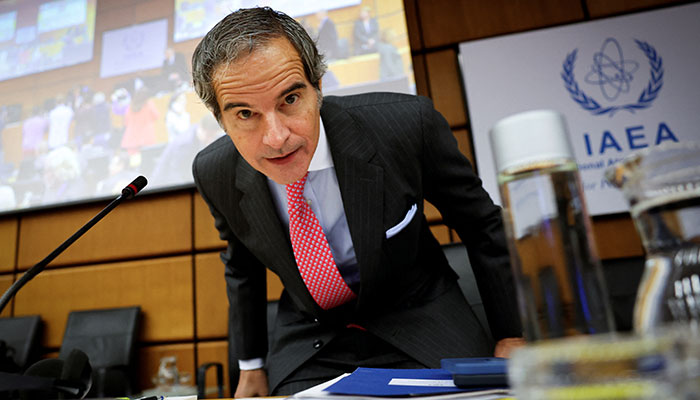
VIENNA: The International Atomic Energy Agency’s Board of Governors, which includes 35 member states, adopted a resolution on Thursday urging Iran to quickly strengthen its cooperation with the agency. The resolution also called for the preparation of a “comprehensive” report aimed at encouraging Tehran to engage in the resumption of nuclear negotiations.
Britain, France, Germany and the United States, which proposed the resolution, rejected Iran’s last-minute move to limit its stockpile of weapons-grade uranium, describing it as insufficient and dishonest. Diplomats said that Iran’s move is conditional on canceling the resolution.
Iran tends to resent such decisions and said it would respond in kind to this decision. After previous criticism of the IAEA Board of Directors, it intensified its nuclear activities and reduced IAEA oversight.
Diplomats who attended the meeting said that China, Russia and Burkina Faso voted against the text. 19 countries voted in favor of the resolution, and 12 countries abstained from voting.
The International Atomic Energy Agency and Iran have long been locked in confrontations over a range of issues, including Tehran’s failure to explain traces of uranium found in undeclared sites, and last year it prevented most of the agency’s uranium enrichment experts from joining the Iranian inspection team, rejecting it. Expanding the scope of IAEA oversight.
The resolution, seen by Reuters, repeats wording from a November 2022 resolution that said it was “necessary and urgent” for Iran to explain the effects of uranium and allow the IAEA to take samples if necessary. The decision issued in June of this year did the same.
The new text requires the IAEA to issue “a comprehensive and updated assessment of the possible presence or use of undeclared nuclear material in relation to past and current outstanding issues regarding Iran’s nuclear program, including a full account of Iran’s cooperation with the IAEA on these issues.” . “.
Western powers hope that this report, scheduled to be issued by the spring of 2025, will pressure Iran to enter into negotiations on new restrictions on its nuclear activities, albeit with less impact than the 2015 agreement with the major powers that collapsed after then-US President Donald Trump withdrew from the United States. From him in 2018.
With Trump returning to office next January, and Iran enriching uranium well beyond the limits of the agreement, it is unclear whether Trump will support negotiations aimed at setting new limits before those limits contained in the 2015 agreement are lifted on “day.” Termination” in 2015. October of next year.
If new borders are not agreed before then, the report could be used to strengthen the case for so-called “rapid returns,” a process under the 2015 deal where the issue is sent to the UN Security Council and sanctions could be lifted under the agreement. Re-imposed.
Last week, the head of the International Atomic Energy Agency, Rafael Grossi, visited Tehran, hoping to persuade new Iranian President Masoud Pezeshkian, who is seen as a relative moderate, to improve Iran’s cooperation with the agency.
Iranian reaction
Grossi formally informed member states on Tuesday that “the possibility of Iran not increasing its stockpile of uranium enriched up to 60% uranium-235 was discussed” in his meetings with Iranian officials, and that the IAEA had verified that Iran had “begun implementation.” of preparatory measures.
Iran already has enough material enriched to that level, which is close to the roughly 90 percent weapons-grade purity, to make four nuclear weapons if it were further enriched, according to International Atomic Energy Agency standards. It has enough material enriched to lower levels to make more bombs, but Iran denies seeking nuclear weapons.
Grossi said on Wednesday that he had asked Iran to cap its stockpile of 60 percent of the materials and that Iran had accepted his request.
He said at a news conference that day that it was a “concrete step in the right direction,” suggesting that he felt the decision might undermine that progress.
With the adoption of the resolution, Iran is likely to respond.
Moments after the vote, Iranian official media reported a joint statement from the Ministry of Foreign Affairs and the Atomic Energy Organization of Iran saying that the head of the Iranian nuclear program, Mohammad Islami, had issued orders to take measures such as activating several new and advanced centrifuges, which are uranium enrichment machines.
“If a resolution is reached, (Iran) will increase its activities or reduce the agency’s reach,” a senior diplomat said before the vote.
